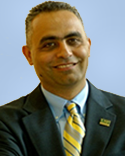Leadership Development Perspective:
Commit to Developing and Exercising New Skills
Commentary by Mo Kasti, Founder and CEO, Physician Leadership Institute,
Every other industry has evolved from the Craft Age to the Industrial Age to the Information Age. Health care is still transitioning from the Craft Age — where each physician practiced medicine in his or her own way — to the Industrial Age, where we are creating consistency in care. We haven’t applied much in the way of developments from other industries, so many of our problems are unique and we have to innovate our way to a solution.
This requires physicians to pursue professional development and health care organizations to commit to improving engagement with physicians. New skills are needed because the health care system has changed from the structure that physicians were trained for. Physicians are used to working independently, but now must practice integrated care. For example, a surgeon may go from an operating room where he or she is in complete control, to a conference room where he or she has to interact and collaborate with colleagues. That is not an easy switch to flip. We have to help them make the transition.
Physicians are trained to demonstrate their knowledge, clinical skills and decision making, and they are great at those things. Those activities all occur on the same side of the brain. To succeed in today’s environment and improve patient care and outcomes, they need to activate social skills that are on the other side of the brain, which many find uncomfortable. However, as leaders, physicians need to improve their “soft” skills and contribute to the health of the entire organization, not just their individual patients.
Emotional intelligence and leadership skills can be developed through training and coaching. Physicians need to commit to developing these skills, while administrators must commit to nurturing that development and giving physicians the opportunity to practice and demonstrate their skills. Hospital administrators have to look at themselves in the mirror and ask, “If physicians come to the table, are we really listening to them?” A common reason physicians cite for why they are not engaged is, “They won’t listen to me.”
Medical executive committees may need to reorganize their structures so that meetings are not dominated by one or two individuals’ styles, which tends to cause physicians, who have a lot to contribute, to disengage. Medical staff leaders need to step up their leadership skills to communicate, coach and engage the medical staff at large.
Physicians are talented people. They have the potential to not only fully engage, but to innovate and positively influence others. We just have to create receptive cultures and commit to physician development.


